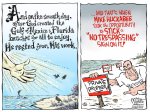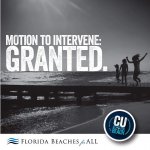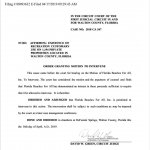Beachcomber
NOTES FROM THE APOCALYPSE
It’s Not Augusta National
Published on April 11, 2019
By Charles Morgan III
The beach that runs the length of the Panhandle of Florida was once known for its soft, snow-white sand. It is now getting recognition for the threatening and confusing “No Trespassing” signs that stretch for miles.
The same beaches that have drawn millions of tourists and spawned the only industry the area has ever had are now a battleground. The epicenter of the battle is 30A. The legal proceedings that will decide whether the public has access to the beaches are underway.
Daytona Beach v. Tona-Roma has been, for almost 50 years, the legal precedent that has dictated the public’s access to beaches in Florida. The court ruled that regardless of what a deed described, beachfront property owners purchased their property “burdened” with the knowledge of “customary use”—that the beach portion of the property had been used by the public for many years.
Beachfront owners are, ironically, now in a situation analogous to another legal precedent. It involves “moving to a nuisance.” It is a common sense approach to a different kind of property issue. Its premise is that you can’t move next to an airport and then start complaining about the noise. Actually, you can complain about the noise but you can’t do anything legally about it.
Those who purchased beachfront property on 30A and were expecting a quiet, bucolic, peaceful setting missed the turnoff to Vermont and must be both geographically challenged and terribly confused.
Those who aren’t interested in following the rulings of the court might not like the teachings of the bible either. Mathew 7:24-27 speaks of “a wise man who built his house on a rock” and “a foolish man who built his house on the sand.” When “the rain fell, and the floods came, and the winds blew and beat on that house…”—well, you can guess what happened.
As to the beaches, even beach house-owning, property rights activists like the ex-governor, preacher, presidential candidate and current talk show host Mike Huckabee understand one thing. If the state of Florida re-nourishes our beaches after a storm, those beaches become, inarguably, public property. Apparently, they’re willing to take that risk.
Of course, our beachfront property owners have federal flood insurance, which is remarkably inexpensive (supplemented by all of us), to handle property damage. They’ll need it one day, because while you can deny climate change at your own risk, there’s a hard rain’s a-gonna fall.
Daniel Uhlfelder and Dave Rauschkolb have been fighting the privatization of the beaches for years. A lawyer and a restaurant owner, they both know the value of the beaches to the local economy. They know what’s right and they have lots of supporters.
Two other people who have become allies in insuring the right of the public to enjoy the beach have come forward recently. They have remarkably different backgrounds. One thing they share is common sense.
On both an international and (thankfully) local level, George Landegger may be the most important philanthropist in our area. He is a resident of Connecticut and has had homes in Walton County for 43 years.
Landegger recently opted out of a lawsuit his beachfront community filed with the state. The suit claims that the beaches are privately owned and not for public use. He was the only property owner in his association to refuse to join his neighbors on 30A in the suit.
“The status quo that has been in place for many years has provided beachfront owners and the general population with great enjoyment and a strong economy on 30A. Besides being a moral issue—if it ain’t broke, don’t fix it,” he said.
Joining Landegger in the efforts to secure access to the beaches for everyone is his friend and the only Walton County commissioner to carry every single precinct.
Trey Nick, the owner of the iconic Nick’s Seafood Restaurant, is a throwback to the old days. Nick works Choctawhatchee Bay like his grandfather and has the largest blue crab operation in the Panhandle.
“I just want to be able to take my kids to the beach the way my parents and grandparents took me when I was a little kid,” he said. “I’m not going to track sand in your house or swim in your pool.
“99.9 percent of the people who live here can’t afford multimillion dollar beach houses,” he continued. “The beach has always been a place where people from all income levels can go. Just because people don’t have much money doesn’t mean they shouldn’t be able to enjoy a day at the beach.”
I know many people who are South Walton natives. They’ve lived and played around the beaches of Walton County for many years. They were there before 30A was “branded” with the little blue automobile decals.
In general, they’re a different type—in a really good way. You can find a bunch of them at the Red Bar in the late afternoon. They know who the beach belongs to.
It’s important that the newcomers to 30A understand one thing. When it comes to the beaches, it’s not like being a member at Augusta National.
The beaches belong to the people.
NOTES FROM THE APOCALYPSE
It’s Not Augusta National
Published on April 11, 2019
By Charles Morgan III
The beach that runs the length of the Panhandle of Florida was once known for its soft, snow-white sand. It is now getting recognition for the threatening and confusing “No Trespassing” signs that stretch for miles.
The same beaches that have drawn millions of tourists and spawned the only industry the area has ever had are now a battleground. The epicenter of the battle is 30A. The legal proceedings that will decide whether the public has access to the beaches are underway.
Daytona Beach v. Tona-Roma has been, for almost 50 years, the legal precedent that has dictated the public’s access to beaches in Florida. The court ruled that regardless of what a deed described, beachfront property owners purchased their property “burdened” with the knowledge of “customary use”—that the beach portion of the property had been used by the public for many years.
Beachfront owners are, ironically, now in a situation analogous to another legal precedent. It involves “moving to a nuisance.” It is a common sense approach to a different kind of property issue. Its premise is that you can’t move next to an airport and then start complaining about the noise. Actually, you can complain about the noise but you can’t do anything legally about it.
Those who purchased beachfront property on 30A and were expecting a quiet, bucolic, peaceful setting missed the turnoff to Vermont and must be both geographically challenged and terribly confused.
Those who aren’t interested in following the rulings of the court might not like the teachings of the bible either. Mathew 7:24-27 speaks of “a wise man who built his house on a rock” and “a foolish man who built his house on the sand.” When “the rain fell, and the floods came, and the winds blew and beat on that house…”—well, you can guess what happened.
As to the beaches, even beach house-owning, property rights activists like the ex-governor, preacher, presidential candidate and current talk show host Mike Huckabee understand one thing. If the state of Florida re-nourishes our beaches after a storm, those beaches become, inarguably, public property. Apparently, they’re willing to take that risk.
Of course, our beachfront property owners have federal flood insurance, which is remarkably inexpensive (supplemented by all of us), to handle property damage. They’ll need it one day, because while you can deny climate change at your own risk, there’s a hard rain’s a-gonna fall.
Daniel Uhlfelder and Dave Rauschkolb have been fighting the privatization of the beaches for years. A lawyer and a restaurant owner, they both know the value of the beaches to the local economy. They know what’s right and they have lots of supporters.
Two other people who have become allies in insuring the right of the public to enjoy the beach have come forward recently. They have remarkably different backgrounds. One thing they share is common sense.
On both an international and (thankfully) local level, George Landegger may be the most important philanthropist in our area. He is a resident of Connecticut and has had homes in Walton County for 43 years.
Landegger recently opted out of a lawsuit his beachfront community filed with the state. The suit claims that the beaches are privately owned and not for public use. He was the only property owner in his association to refuse to join his neighbors on 30A in the suit.
“The status quo that has been in place for many years has provided beachfront owners and the general population with great enjoyment and a strong economy on 30A. Besides being a moral issue—if it ain’t broke, don’t fix it,” he said.
Joining Landegger in the efforts to secure access to the beaches for everyone is his friend and the only Walton County commissioner to carry every single precinct.
Trey Nick, the owner of the iconic Nick’s Seafood Restaurant, is a throwback to the old days. Nick works Choctawhatchee Bay like his grandfather and has the largest blue crab operation in the Panhandle.
“I just want to be able to take my kids to the beach the way my parents and grandparents took me when I was a little kid,” he said. “I’m not going to track sand in your house or swim in your pool.
“99.9 percent of the people who live here can’t afford multimillion dollar beach houses,” he continued. “The beach has always been a place where people from all income levels can go. Just because people don’t have much money doesn’t mean they shouldn’t be able to enjoy a day at the beach.”
I know many people who are South Walton natives. They’ve lived and played around the beaches of Walton County for many years. They were there before 30A was “branded” with the little blue automobile decals.
In general, they’re a different type—in a really good way. You can find a bunch of them at the Red Bar in the late afternoon. They know who the beach belongs to.
It’s important that the newcomers to 30A understand one thing. When it comes to the beaches, it’s not like being a member at Augusta National.
The beaches belong to the people.


